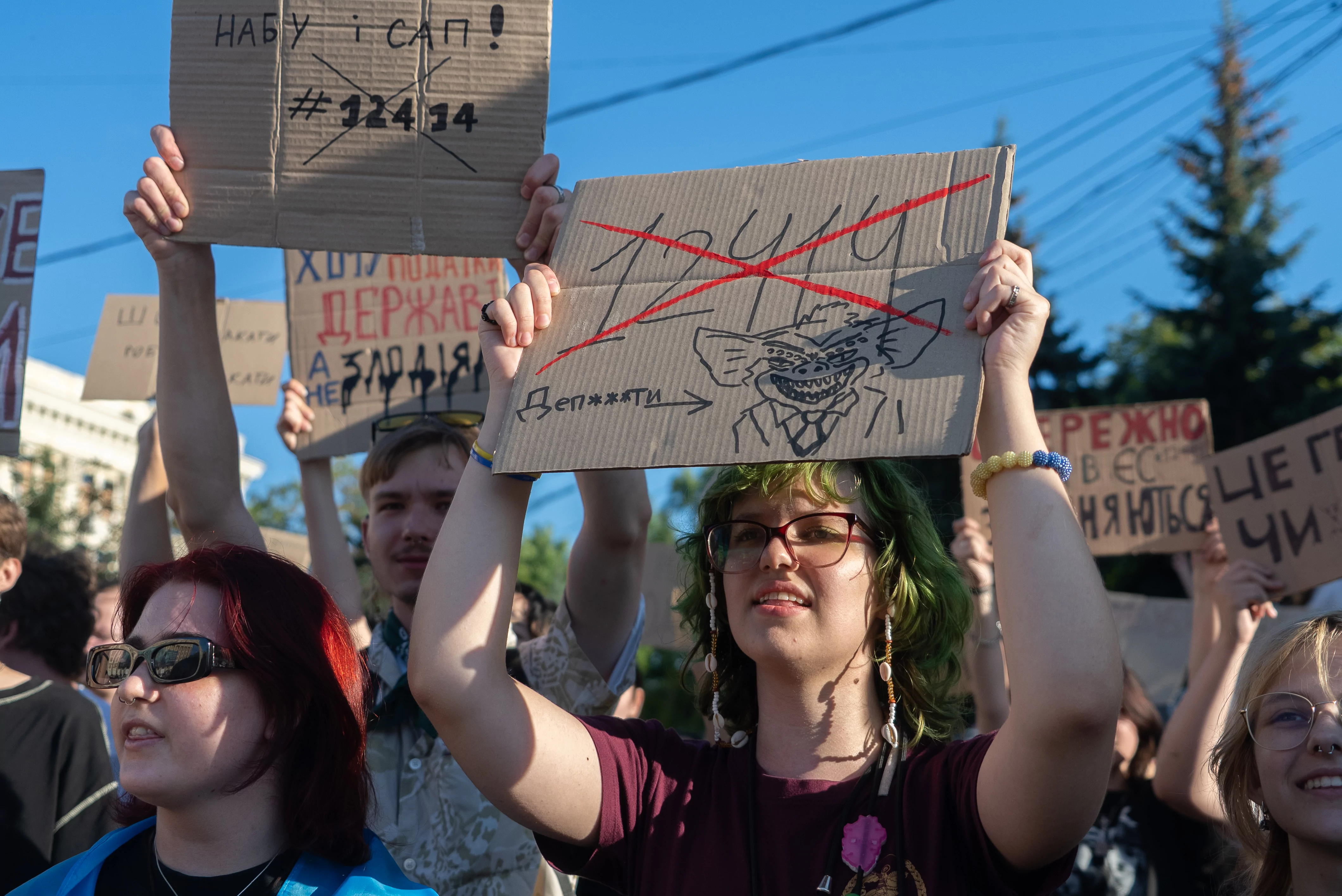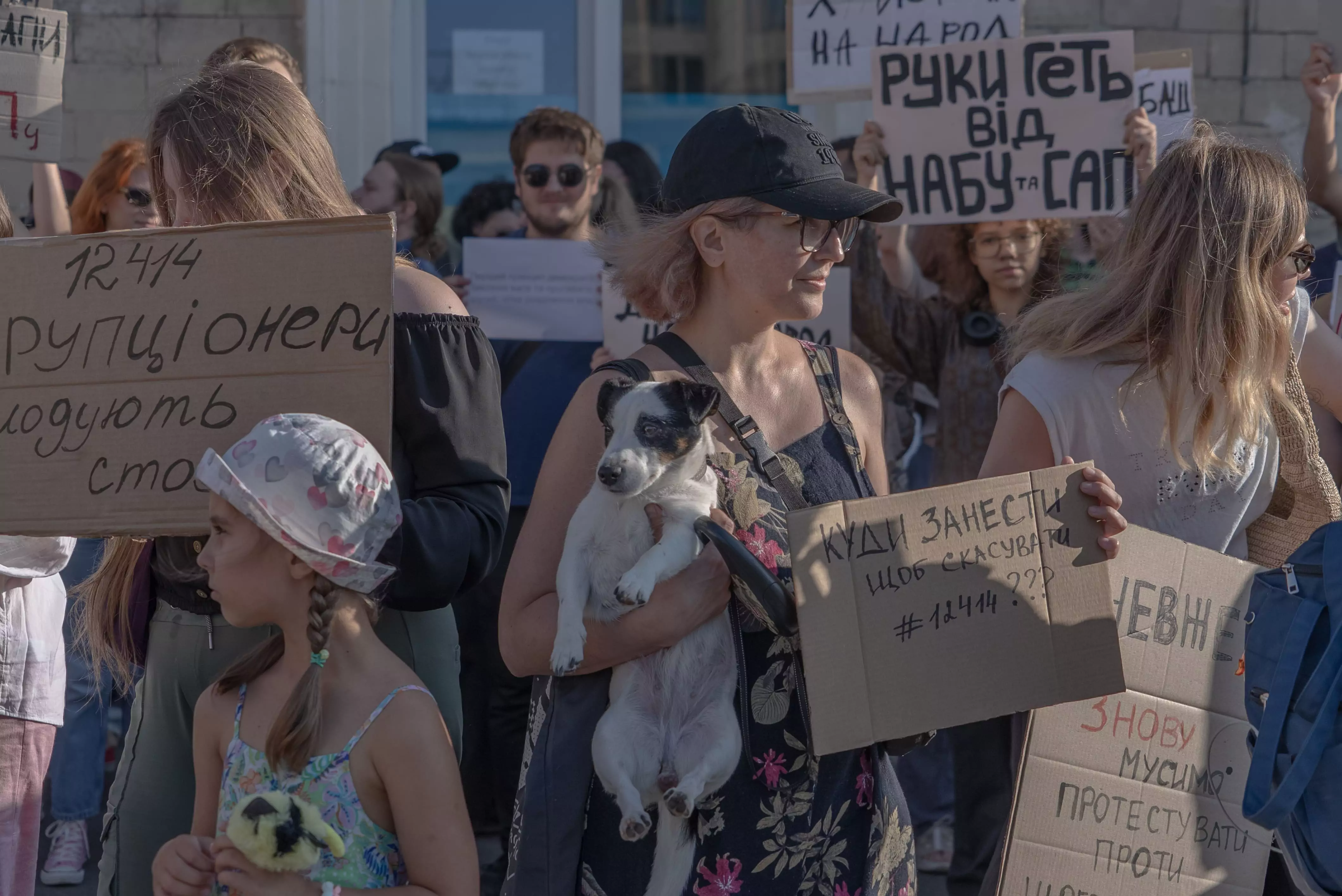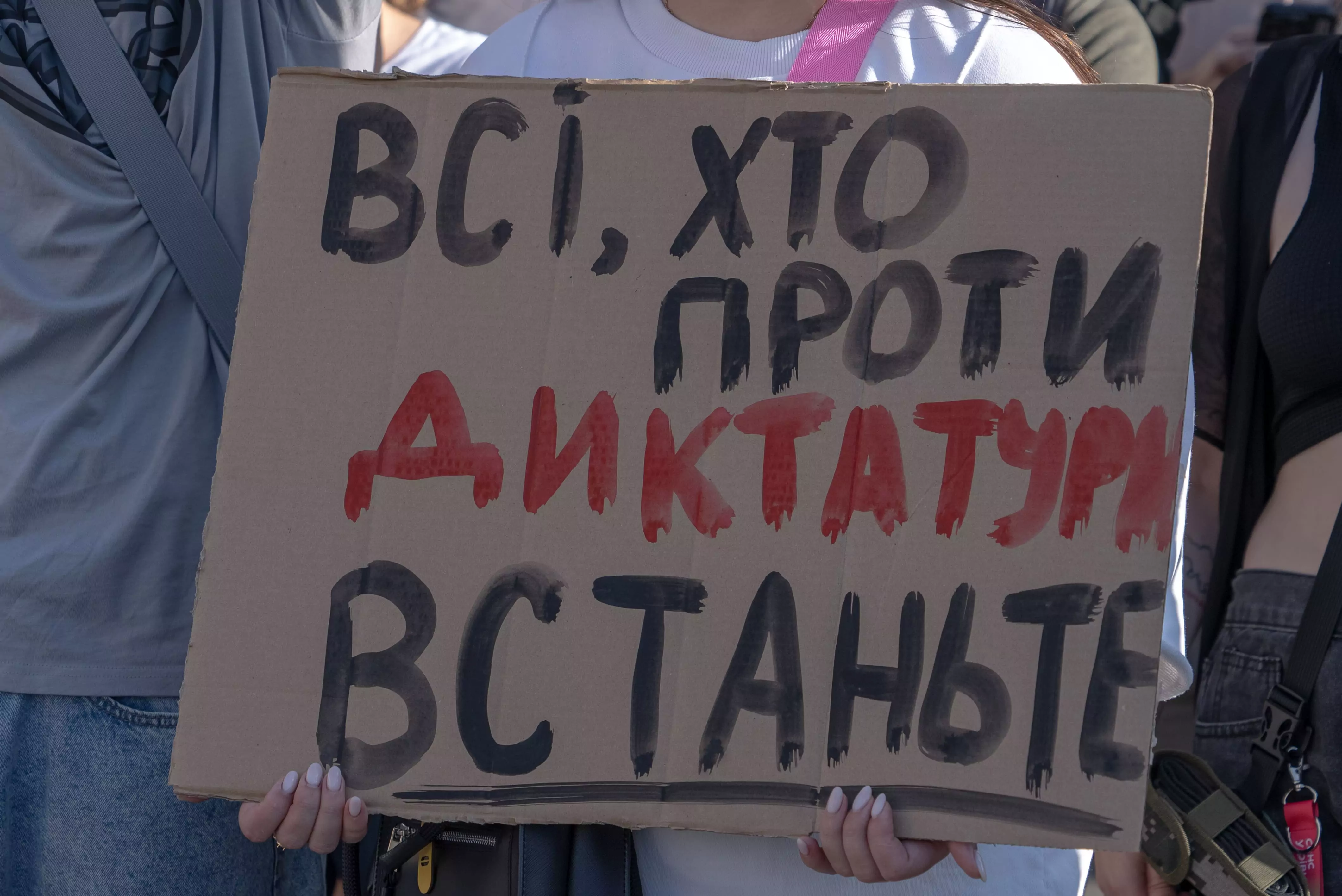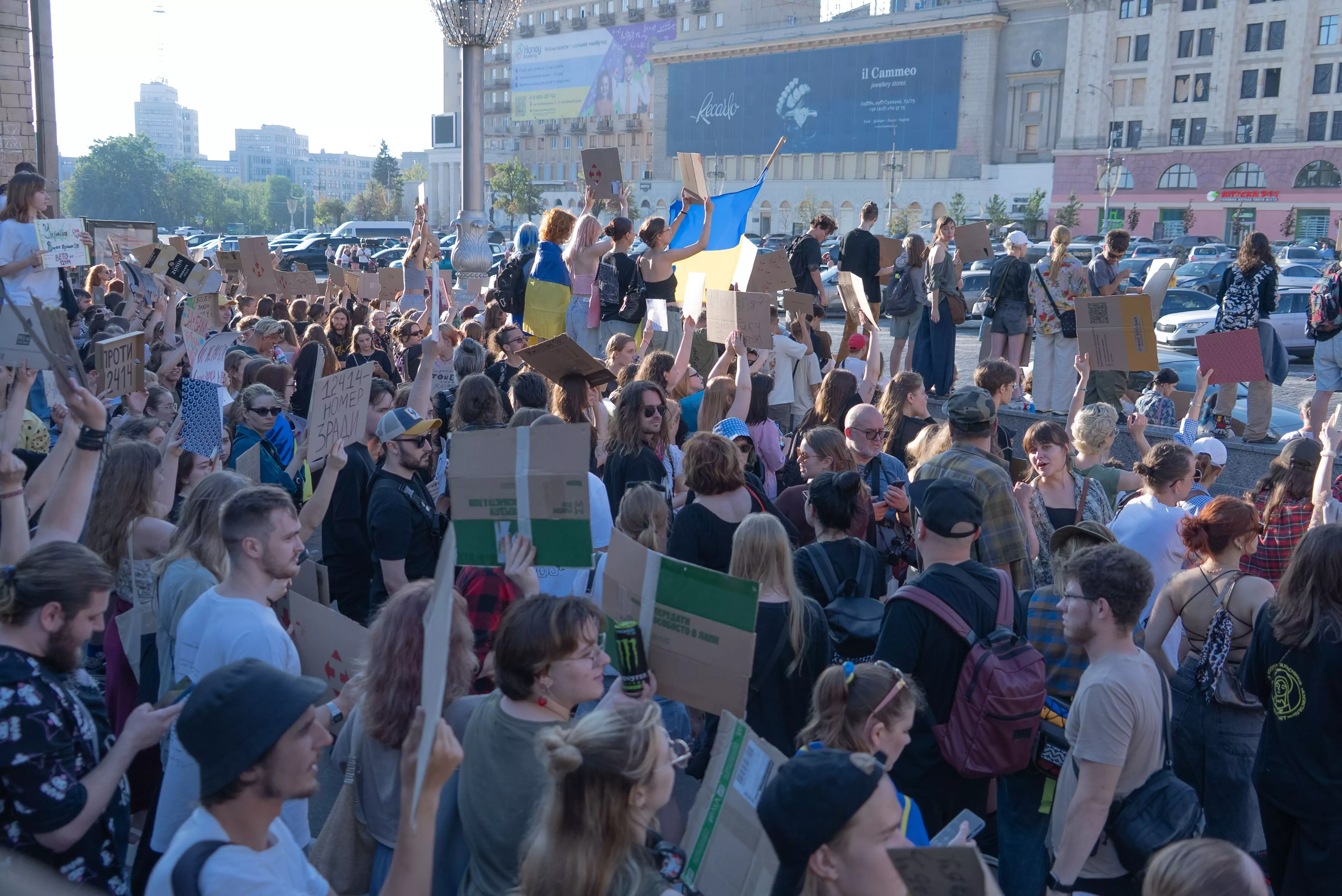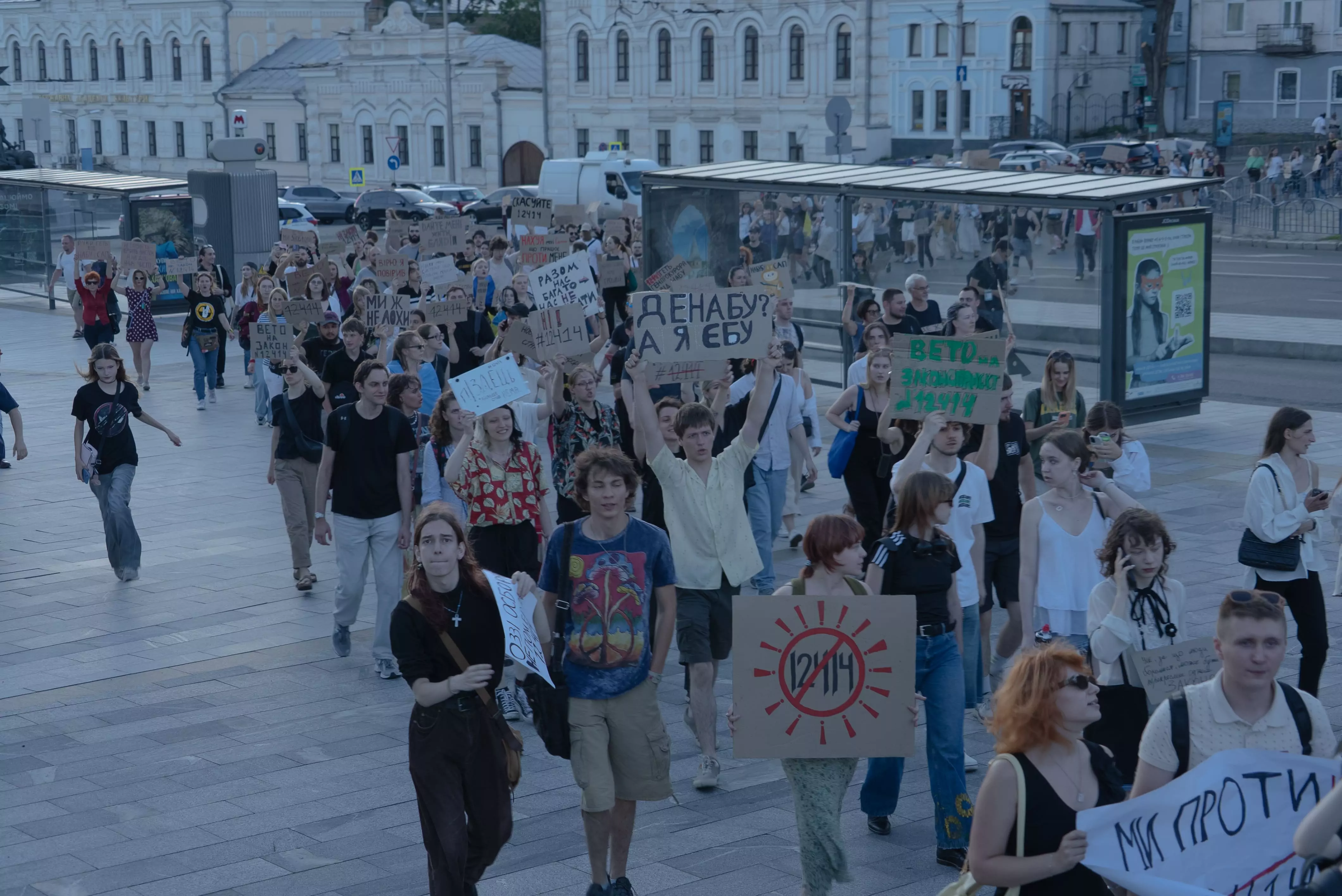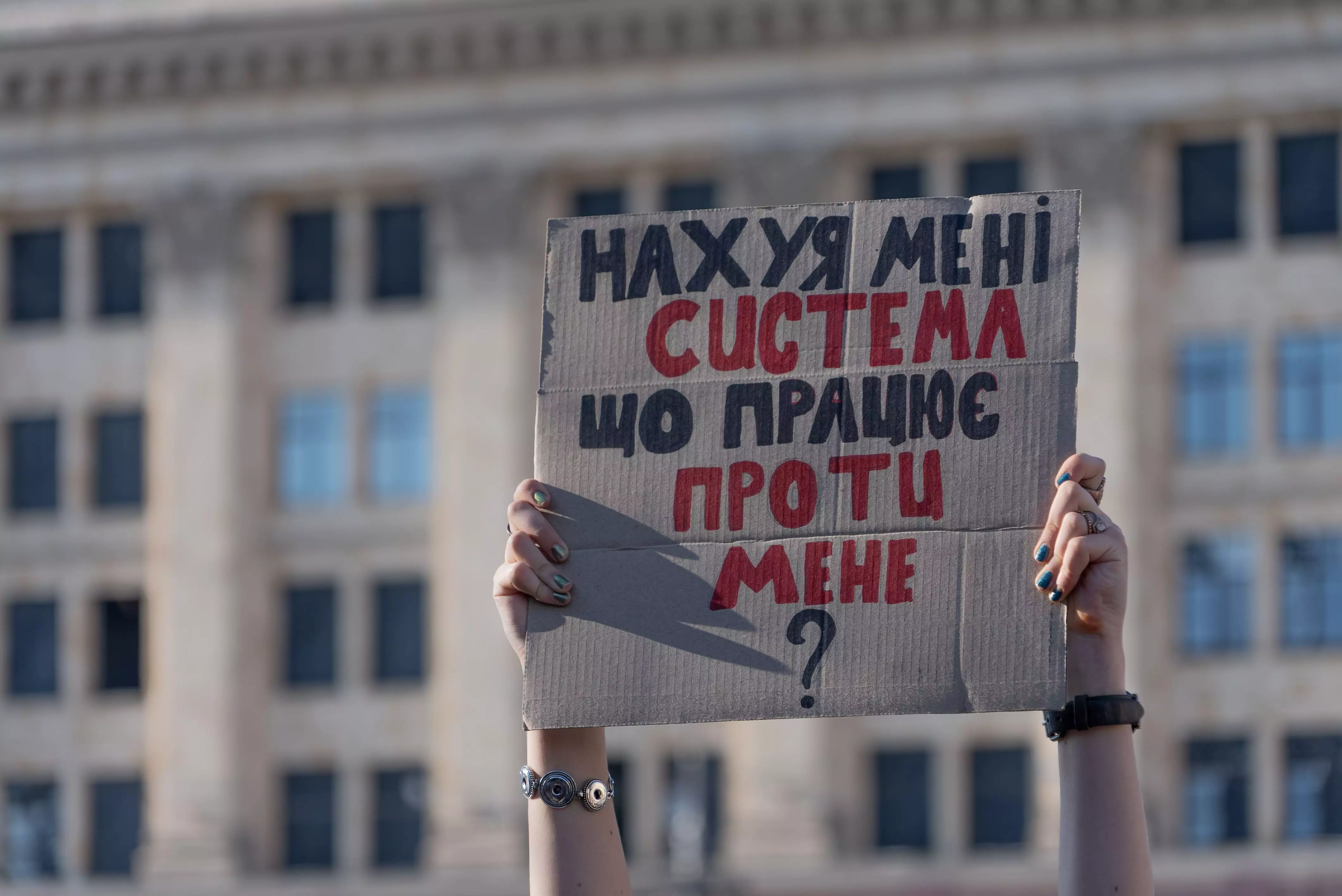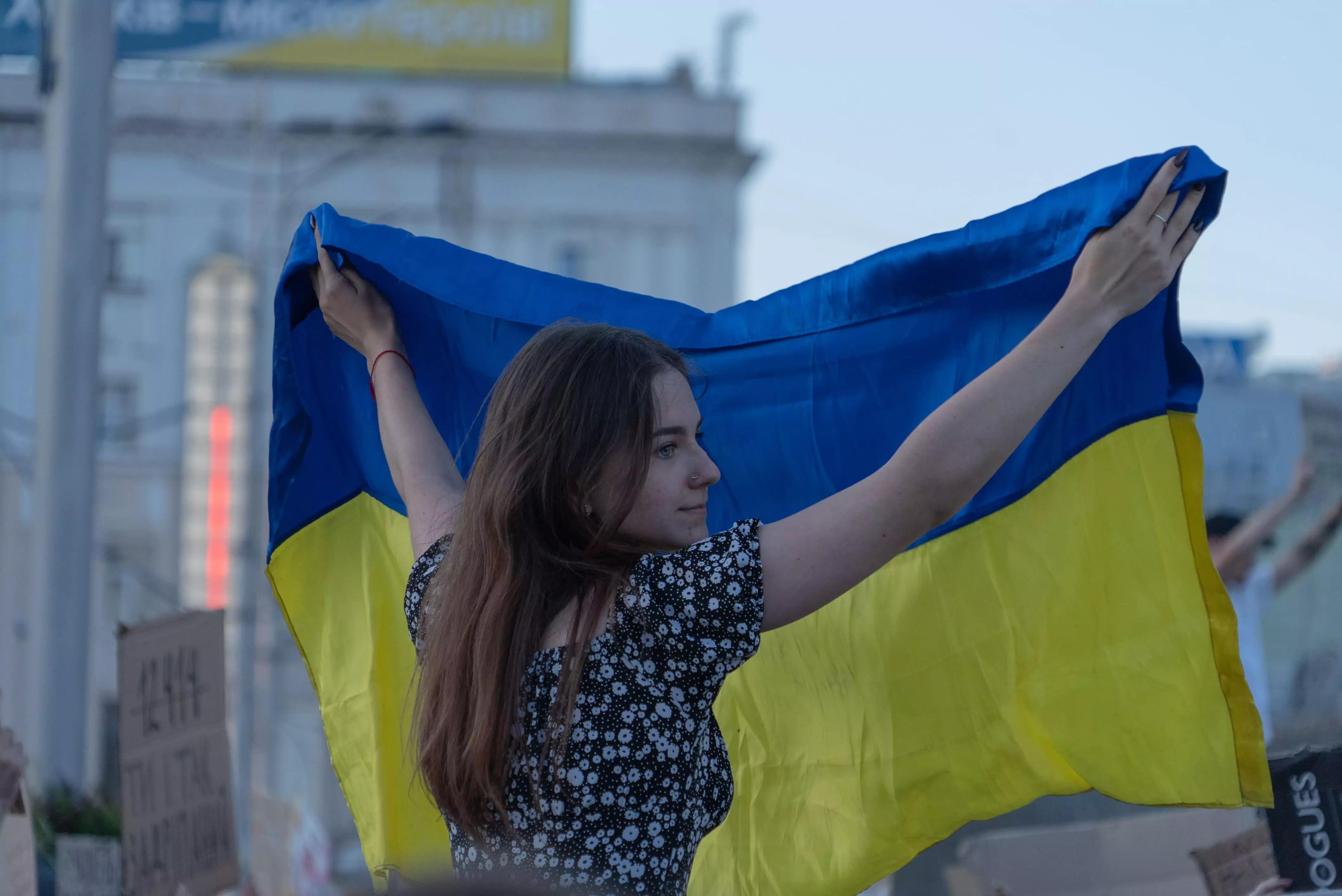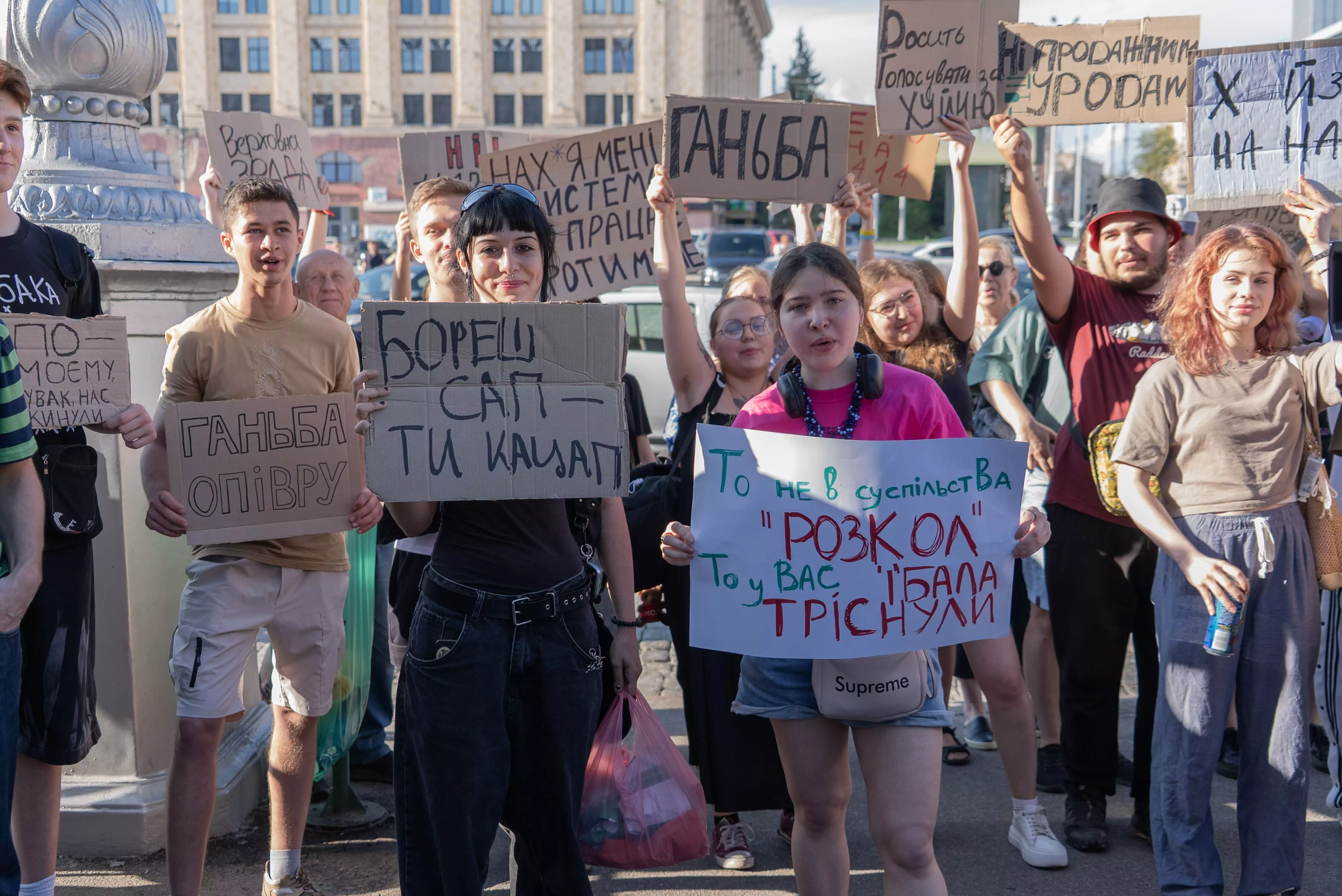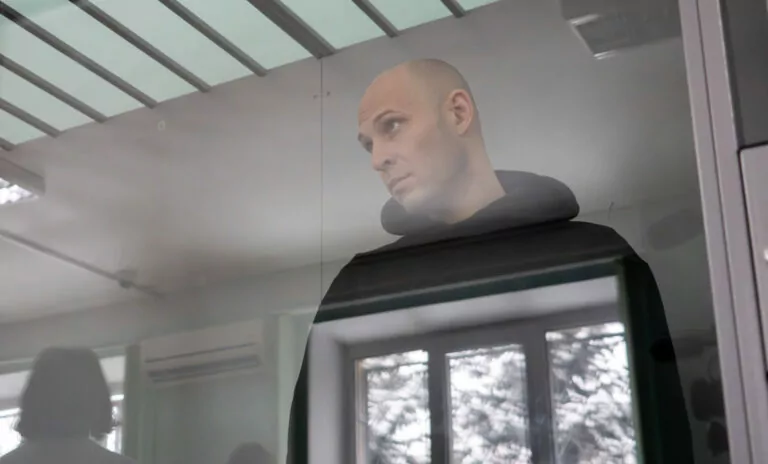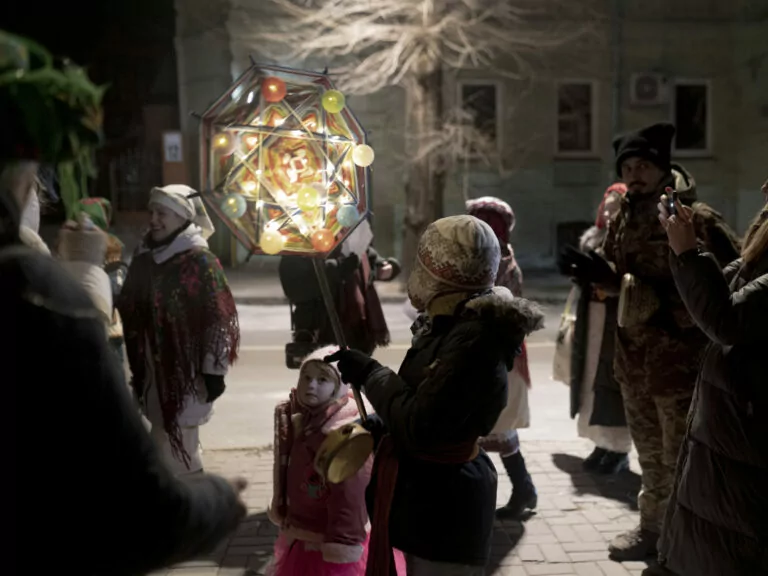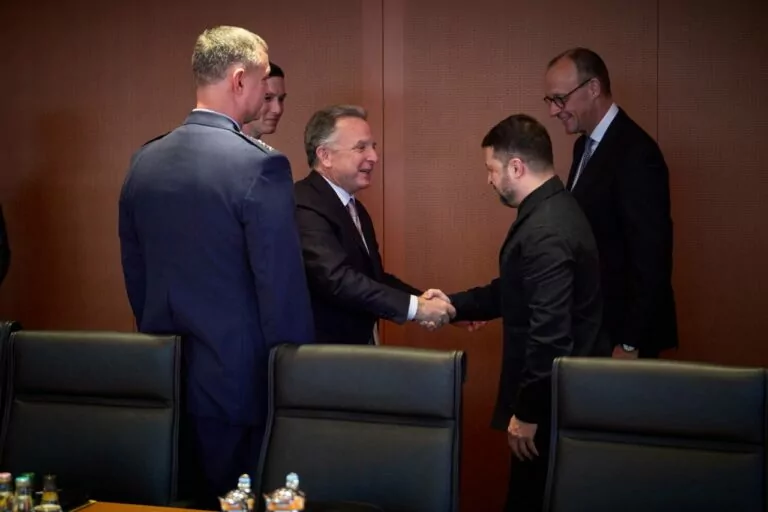UKRAINE, KHARKIV — Russian missiles reach Kharkiv in less than two minutes.
When asked about their reason to protest in the middle of the city in these circumstances — under martial law — Marko says, “what’s happening is absolutely unacceptable”.
On July 22, during the evening, President of Ukraine Volodymyr Zelenskyy signed the Law #12414, despite hundreds of people asking him to veto it across the country-wide protests.
The law, initially aimed to help the relatives of missing soldiers and prisoners of war, was haphazardly filled with new amendments less than a day before the Verkhovna Rada’s — Ukraine’s Parliament’s — session on July 22.
It passed in the second hearing with multiple violations, according to the Agency for Legislative Initiatives (ALI).
The updated version includes clauses that deprive Ukraine’s anti-corruption watchdogs Specialized Anti-Corruption Prosecutor’s Office (SAPO) and the National Anti-Corruption Bureau (NABU) of independence by giving unprecedented power to control them to the General Prosecutor of Ukraine, which is appointed by the President. It also violates the right to private life via allowing searches without court order.
Zelenskyy signed it instead of vetoing on the same day. The next day, the Parliament went on “holiday” until August.
“(The law) directly affects our lives as Ukrainians in this country, and it will now significantly influence the support for Ukraine in the war. No normal, democratic, developed country will pour money or provide weapons for our fight against Russia if our anti-corruption institutions are destroyed,” Marko said.
“We will keep coming out until bill #12414 is repealed.”
Below is a brief context on what’s going on — interspersed with photos from protests in Kharkiv that Gwara Media covered.
So, what do NABU and SAPO do?
The NABU was created as an independent agency to combat high-level corruption after the Euromaidan of 2013. It investigates cases involving former presidents, parliament members, judges, prosecutors, and National Bank executives, particularly those involving large sums of money.
The SAPO is an autonomous division within the Office of the Prosecutor General that coordinates with NABU. While NABU conducts pre-trial investigations, SAPO, as an independent part of the Prosecutor General’s Office, exercises prosecutorial oversight during these high-level anti-corruption investigations and represents the state prosecution in court.
NABU reports to the government, which approves the national anti-corruption strategy. NABU also has its own Civil Oversight Council to ensure transparency and public oversight.
Both institutions were established with the support of Ukraine’s international partners. In particular, the creation of SAPO in 2015 was one of the conditions for Ukraine’s visa liberalization with the EU.
So, the key conditions for NABU and SAPO’s independence are the absence of political interference and exclusive jurisdiction. The Prosecutor General can’t interfere in NABU investigations, and no other law enforcement agency can investigate cases assigned by law to NABU.
Could not, at least.
Why are people in Ukraine and EU officials are angry
On the second day of the protests, when the law already came into effect, — over 400, and by other estimations, up to 1,000 people protested on the streets of Kharkiv. From 6 p.m. to 9 p.m., they marched through the city’s central streets.
Most often, they shouted, “Why do I need a system that works against me?” and called for the new law — or, more accurately, amendments to it — to be repealed.
Some shouted insults at the assistant to the president’s office, Andrii Yermak, often referred to as the shadow leader of Ukraine. Many shouted, “Shame,” “Cancel the law,” “Get your hands off NABU.”
One of the slogans was, “Ukraine is not Russia.” Oleg, a soldier in the Kraken with a poster reading “Zelensky — Ceausescu,” said he came because the country is moving toward totalitarianism, which he and his fellow soldiers are currently fighting against.
“I also believe that protests during wartime are inappropriate. But what else should we do?” said Oleg.
According to MP Anastasiia Radina, a new edition of the law that used to simplify search for includes provisions that “turn SAPO into a decorative institution and make NABU and SAPO entirely dependent on the will of the Prosecutor General.”
The Prosecutor General would have access to all high-profile corruption cases, instruct detectives on what to investigate and reassign cases, and allow them to close investigations of graft agencies. The Prosecutor General would also have sole authority to issue top officials the corruption charges.
“In effect, anti-corruption activity in Ukraine will be destroyed. We’re returning to the system we had under Yanukovych, where all cases went through the Prosecutor General’s Office,” said lawyer Volodymyr Rysenko from the Kharkiv Anti-Corruption Center (KACC) to Gwara’s journalists on July 22 — before Zelenskyy signed the bill.
The lawyer said the law could halt Ukraine’s eurointegration and end international partners’ support and believed the EU should issue Ukraine “an ultimatum” for violating its commitments.
Ukraine’s partners reacted to Zelenskyy signing the bill #14124. Ursula Von Der Leyen expressed her “concern” about the situation with Ukraine’s anti-corruption course and asked Zelenskyy to explain the changes that have been made.
French Minister for European Affairs Benjamin Haddad called the Ukrainian authorities’ decision deeply disappointing and stated that the situation can still be corrected.
Dutch Foreign Minister Caspar Veldkamp said the law’s adoption is a step backward that calls into question Ukraine’s commitment to the rule of law.
Sweden’s Ministry for Foreign Affairs noted that Ukraine has made significant progress in fighting corruption over the past decade, but the law is “troubling” and risks undermining those achievements.
Olena Apchel, a soldier who supported protests against the new law, wrote in her opinion piece, “Passing the law with multiple violations of regulations, pressure on MPs, quick signing, and the absence of veto — it’s not just about demonstration of the right to authoritarianism and autocracy and slowing down eurointegration. It’s stupidly rude in circumstances when the most important laws about defence aren’t being signed for months. And, as a result, — the barrier of self-censorship and self-restraint fall off.”
Doesn’t the law address NABU’s ties with Russia?
In his late video address, released in the night of July 23 — by then first protests, including the one in Kharkiv, were over and the curfew across Ukraine began — Zelenskyy said that the new law aims to protect the anti-corruption infrastructure from Russian influence and referred to leaks to the Russians from anti-corruption watchdogs, providing no proof of them.
He noted that NABU and SAPO will continue to function, but expressed disconcern about NABU’s criminal proceedings taking too long and corrupt officials who have fled the country continue to go unpunished.
Was there really Russian influence? On July 21, three NABU employees were detained and accused of high treason, collaboration with Russia, and corruption. For some of these cases, detectives say they didn’t see any evidence — but agreed to fully cooperate with the investigation.
The SBU, along with the Prosecutor General’s Office and the State Bureau of Investigations (SBI), conducted about 70 searches of 15 employees from the NABU and SAPO.
The searches, according to the NABU, were conducted without court-issued warrants — and three detectives sustained bodily injuries during them. Most of them, the agency said, weren’t related to the investigation of Russian ties, but to the cases of traffic accidents, one of which happened back in 2021.
NABU also said SBU warned them about possible Russian ties of one of the detained in 2023, but then the SBU itself found no evidence of them.
Volodymyr Rysenko suggested that the large-scale actions by the SBU and SBI may be connected to sensitive cases investigated by NABU and SAPO.
On June 23, NABU issued a notice of suspicion to former Deputy Prime Minister Oleksii Chernyshov, a close associate of President Zelenskyy and Head of the President’s Office Andriy Yermak. According to the Anti-Corruption Action Center (ACAC), NABU and SAPO have gotten too close to the president’s inner circle, including through a case involving his business partner Tymur Mindich.
All in all, experts say there’s nothing in the amendments that can help uncover or prevent Russian influence. Kateryna Butko, head of the anti-corruption watchdog AutoMaidan, said to the Kyiv Independent that it’ll “unlikely have an impact” on Russian agents. But it definitely destroys the independence — according to the ALI, not only of anti-corruption watchdogs, but also of any prosecutor in Ukraine.
Apchel believes the protests are not primarily about defending NABU and SAPO as institutions but about defending the democratic course chosen by the people.
“Yes, there are many questions about the work of NABU and SAPO. That is why the issue is not about them. The issue is about the right to have institutions. Because we believe in institutions, because I believe in institutions, because they are made up of people and are based on values,” said Apchel.
What about Zelenskyy’s new bill from July 24?
On July 23, a group of MPs drafted a new bill that restores the independence of NABU and SAPO.
Zelenskyy met the heads of NABU, SAPO, and other law enforcement agencies on July 23 and promised that he’s also preparing a draft bill for Parliament, noting that “what people are saying on the streets” and online is not “falling on deaf ears.”
“And there will be no Russian influence or interference in the activities of law enforcement,” Zelenskyy added.
He stressed that “the most important thing” is “not losing our national unity, ending the war, stopping this Russian evil, and securing a dignified peace for Ukraine.”
In the evening of July 24, when the protests started in many cities for the third day in a row, Zelenskyy released the “promised” new bill.
The third meeting gathered over 200 participants in Kharkiv. During the protest, Russia hit the outskirts of the city with a drone attack.
According to the analysis by the Agency for Legaslative Initiatives, Zelenskyy’s law restores independence of anti-corruption graft agencies, removing “all limitations on the procedural independence of SAPO,” but “encroaches on the institutional autonomy” of NABU and SAPO. To combat “Russian influence,” Zelenskyy proposes polygraph checks, “conducted by the SSU or in accordance with SSU methodology” every two years.
The grounds for urgent searches, conducted without a court order, have also been repealed.
The ALI says the bill does nothing to address the fact it’s still possible “to appoint individuals to the prosecution service without a competitive selection process.”
Some MPs are saying the new bill will be put to the vote next week, but Gwara’s sources say the Parliament might deliberately delay the process.
Daryna, one of the protesters, said at the end of the protest on July 24, “Most likely, this is a bill that will be passed. The only way it could be rewritten and modified is, once again, through amendments in the second and third hearings. Which is why it’s important to continue. We haven’t finished yet. (Zelenskyy’s bill) is not a reason to stop public pressure.”
Dmytro Oliinyk, a veteran who came to the protests, had a poster: “I needed to survive to see this wonderful youth.” He said protests like this are exactly why he volunteered to fight against the Russian invasion — “for you to stand up for your rights.”
Update: This text covers the first three days of protests against the law. On July 25, Zelenskyy met with journalists on the press conference and said “there should have been dialogue” between the Parliament and society before the law #12414 adoption and noted he “respects public opinion.” The Verkhovna Rada’s chairman said the session is scheduled for July 31.
Gwara follows how the situation will develop — both in Parliament and on the streets in Kharkiv (but we’re a bit quicker on our Ukrainian version — only three of us cover news in English). Please, support our reporting by buying us a coffee or subscribing to our Patreon.
Read more
- Second day in a row: Russian glide bomb attack injures 14 in Kharkiv, damages hospital (Photo)
- Russia shifts to massive waves of drone strikes, overwhelming Ukrainian air defense with numbers, decoy tactics
